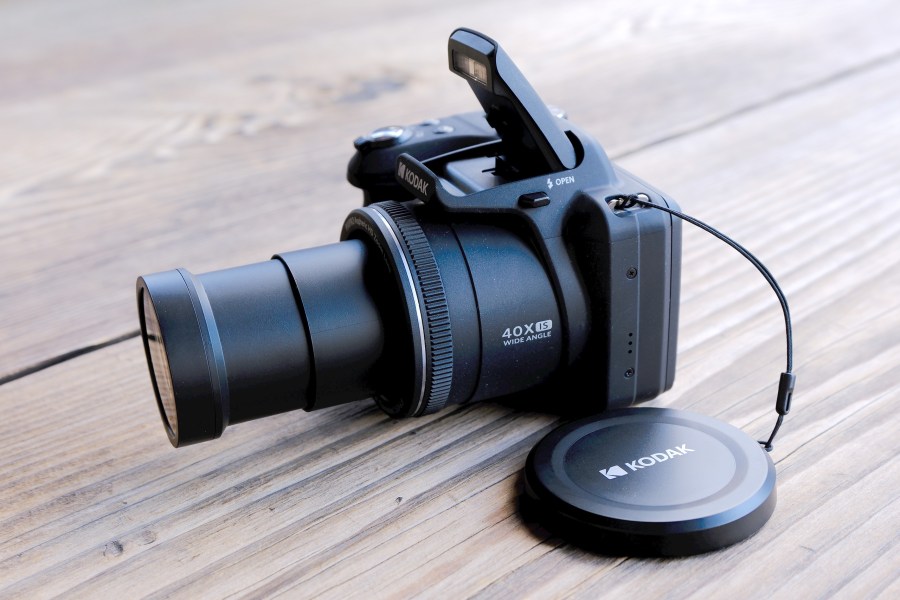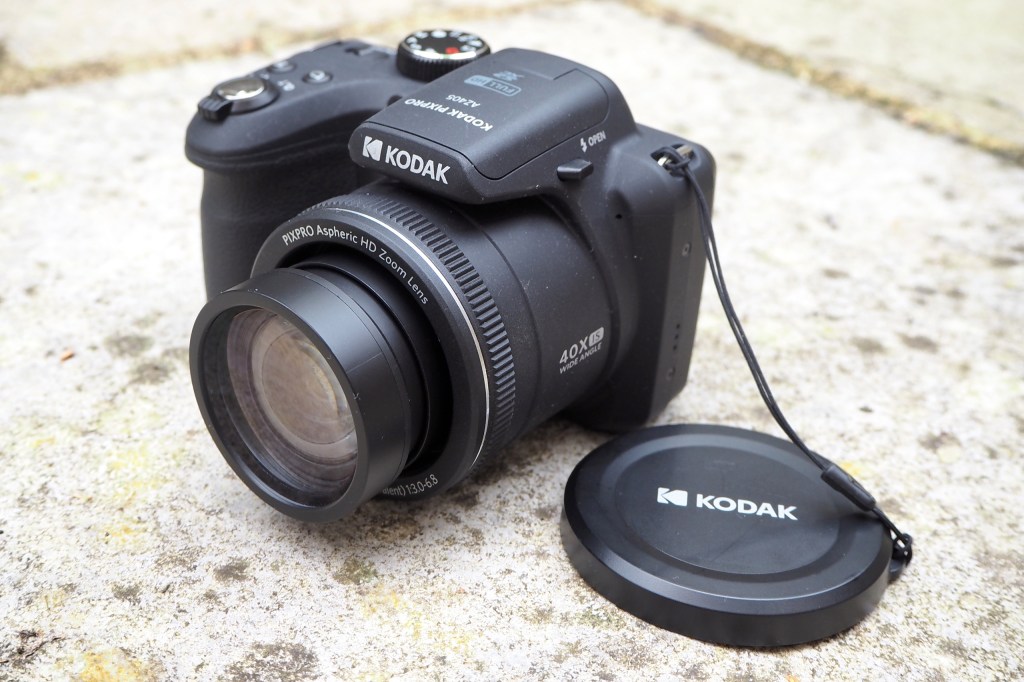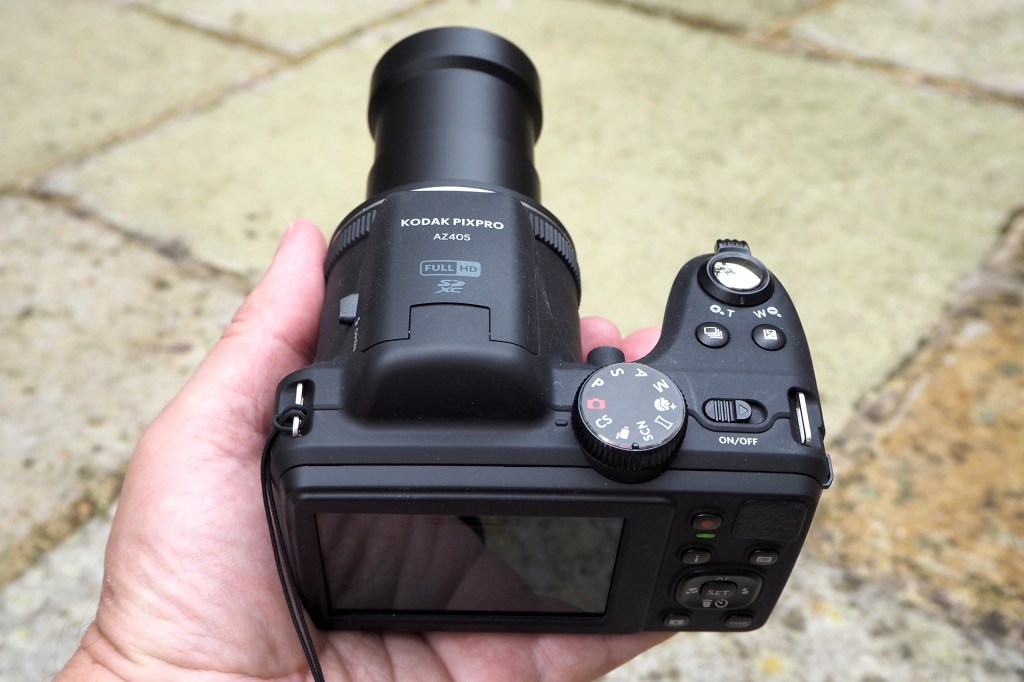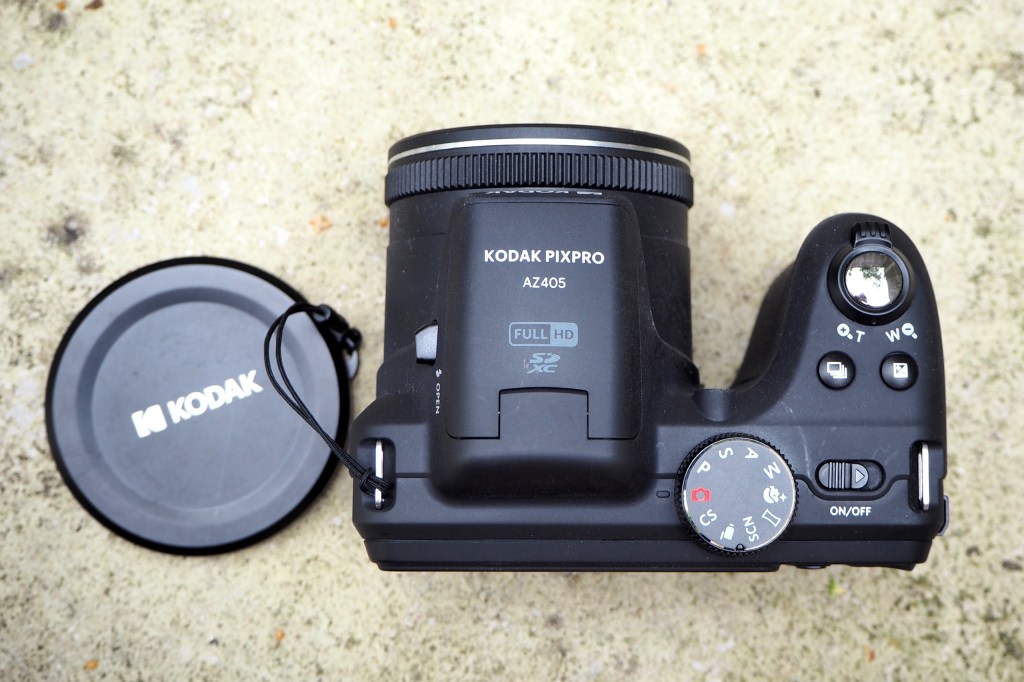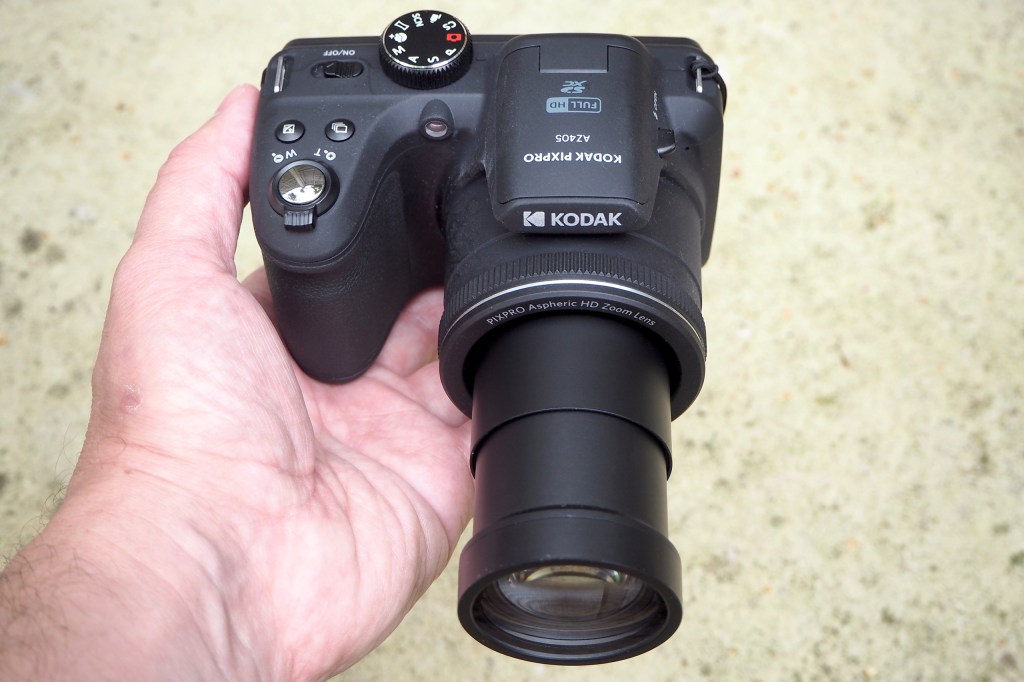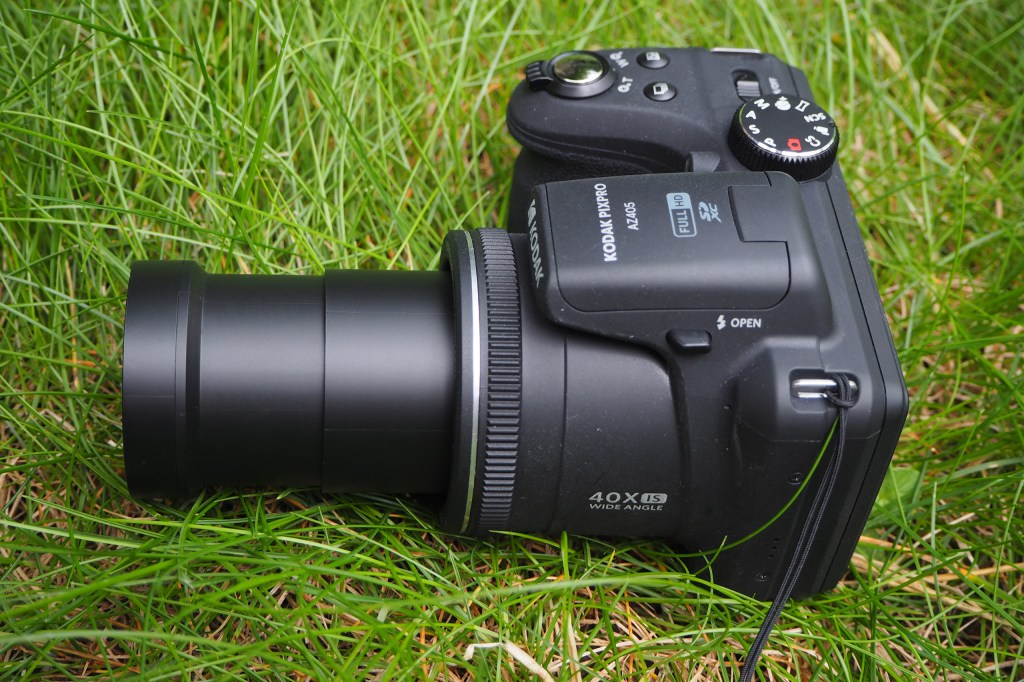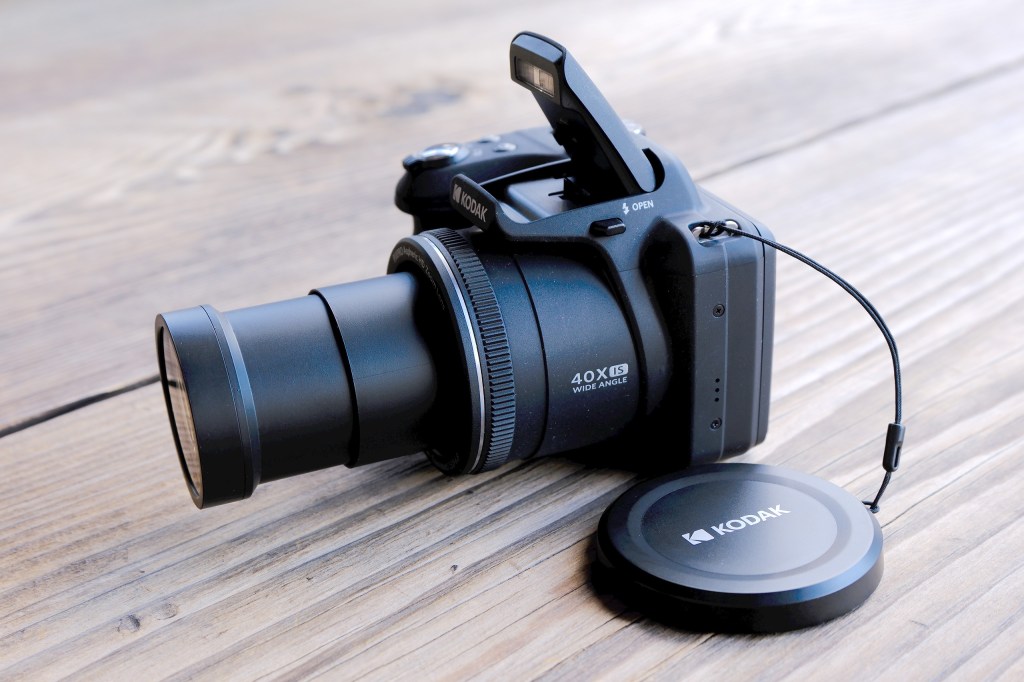Amateur Photographer verdict
The low price, and 40x optical zoom reach, may mean we can forgive the low image quality. The lack of Wi-Fi connectivity and viewfinder is another compromise to be aware of.- Compact body, broad focal range
- Straightforward controls
- Powered by easy to find AA batteries
- Reasonably priced, with a decent build quality
- The closer towards maximum telephoto the softer the images
- Fall off of focus into the corners at maximum wideangle
- No eye level viewfinder
- No rechargeable battery provided
- Slower response times than the mini DSLR it resembles
Kodak Pixpro AZ405 At a glance:
- 20MP 1/2.3-inch BSI CMOS sensor
- 40x optical zoom lens, f/3.0-f/6.8, 24-960mm equivalent
- 50cm to 200cm minimum focusing range, or 1.6cm macro at widest setting
- 3-inch LCD screen, 460K dots
- Built-in Optical Image Stabilisation
- Full HD 1920×1080 pixels at 30fps video recording
- Powered by 4x AA alkaline batteries, provided
- 114.3×81.6×84.4mm, 436g
- $179 / £199
Very few manufacturers are making bridge cameras any more. A notable exception is current Kodak product developer JK Imaging. Gavin Stoker takes a look at its latest long lens behemoth, the Kodak PixPro AZ405, with a 40x optical zoom lens.
Some 15 to 20 years ago, bridge cameras, super zooms, ultra-zooms and all-in-ones – differing terms for the same thing – were all the rage. Camera manufacturers’ seasonal updates would typically include a glut of new models offering ever-increasing zoom capability, while maintaining a relatively modest body size, weight and price. They were enticing for enthusiasts; especially when an equivalent DSLR and lens combination could cost users as much as a family car.
However, partly because of the small sensor at their heart, image quality from a bridge camera was no match for a proper DSLR, with results typically closer to what we’d expect from a point and shoot compact. Then, when bridge cameras seemed at their most popular, along came smaller mirrorless cameras that did actually manage to achieve a DSLR-like quality… and we all assumed the bridge camera was dead.
Just like with film and pocket-sized digital compacts, could it be, however, that bridge cameras could make something of a comeback? With pretty much all the major manufacturers having dropped bridge models from their line up, the appearance of the Kodak Pixpro AZ405, barely altered from its predecessors, feels like something of an anomaly. With the ‘AZ’ grandly standing for ‘Astro Zoom’, has any new technology from the intervening years been deployed here? Let’s take a deeper dive before drawing any conclusion.
Kodak Pixpro AZ405 Features
The key reason for any of us considering a Kodak Pixpro AZ405 purchase is the generous 40x optical zoom shoehorned into a body that, with a squeeze, could just about fit into a coat pocket. Here said zoom is the 35mm equivalent of 24-960mm, thereby suggesting itself as a jack-of-all-trades travel option. We found it adept at capturing everything from landscaped gardens to close ups of ornate carvings high up on the apex of ancient temples.
What’s missing compared to an actual DSLR or mirrorless camera that would cost us a whole lot more than this compact Kodak branded super zoom is the ability to swap lenses. Though the counter argument is that its 40x zoom provides all the flexibility in framing and composition anyone might need. The compromise is that there’s also no eye level optical or electronic viewfinder for those of us who prefer to compose the image that way, free from surrounding distractions, or as a visual aid when the sun is shining too brightly on the provided screen. Stills and videos on this Kodak are both composed via fixed, non-tilting rear plate LCD, which is not a touch screen.
We don’t get a rechargeable lithium ion battery either. Here the bridge camera is powered by four AAs, with four bog standard alkaline cells supplied in the box to get us initially up and running. Fortunately, with an eye on longer-term use, it will also work with rechargeables. Power consumption appears modest – with occasional use it lasted us the duration of a three week holiday – and the weight and added heft four AAs supply enabled us to keep the camera slightly steadier and wobble free when attempting shots towards the maximum telephoto end of the zoom. Officially, battery life is good for 300 stills, or two hours of maximum resolution video, which is again pretty much industry standard.
How does the Kodak Pixpro AZ405 compare to its AZ255?
Outwardly, the 40x optical zoom AZ405 very closely resembles its slightly-more-affordable-still 25x zoom Kodak Pixpro AZ255 sibling, except for the AZ405’s profile being slightly deeper because of the added lens reach. This also allows for a button to activate the spring-loaded pop up flash on the AZ405, whereas on the spring-less AZ255 the built-in flash has to be raised manually.
Both bridge models state their intent to find an enthusiast audience by resembling DSLRs that have shrunk in the wash, said design always being very much de rigeur when it came to bridge cameras, super zooms and all-in-ones; however you choose to term this class of camera. The other fact to mention is that while the AZ405 boasts a maximum 20MP resolution for eking out that bit more detail, the AZ255 fields a more modest 16MP sensor. That doesn’t always translate to better or worse image quality in practice, though the side by side the 16MP did appear softer on occasion, while we also encountered more instances of visible pixel fringing with the AZ255.
What are the other features of the Kodak Pixpro AZ405?
Lens aside, the other key feature to consider is of course sensor size and resolution. When it comes to the Kodak Pixpro AZ405, a 20.88 megapixel effective resolution may seem plenty, yet bear in mind this is from a bog standard, aka small, 1/2.3-inch sized CMOS sensor. That sort of spec is what we’d more typically find in a point and shoot 3x or 5x zoom compact, even if said chip is backside illuminated to theoretically boost light gathering efficiency.
While the option to record video is provided alongside the ability to capture stills, here movie resolution is an old-school Full HD 1920×1080 pixels, rather than the now standard 4K we’d find elsewhere. Want to transfer images? There’s no Wi-Fi option here, rather the ability to remove the SD card and stick it in a card reader or use the USB port lurking under a side flap to hook the camera up to a PC. It really is back to basics.
How is the Kodak Pixpro AZ405’s Handling and design?
The shape and design means that the Kodak Pixpro AZ405 handles like the mid way point between a point and shoot compact and the entry level DSLR it resembles, complete with knurled top plate shooting mode dial. This ensures there’s nothing too taxing about the operation.
With a flick of the on/off switch the camera powers up ready for action in 2-3 sections, the rear LCD panel bursting into life to display a view of whatever’s in front of the lens. With a nudge of the lever that surrounds its large, shiny shutter release button, the lens takes around 4-5 seconds to travel from its initial maximum wide-angle starting point to extreme 40x telephoto setting.
Stills and video are saved to removable SD card which we’ll have to provide ourselves as expected, though, again as something of a hark back to days of old, there is a tiny 67MB internal memory. Shooting modes are chosen with a twist of that familiar top plate dial, which here includes the regular P, A, S, M settings alongside fully auto option, video, scene mode, portrait mode and panorama option. The layout and operational settings are pretty much exactly what we’d have expected to find on a camera of this ilk. So in terms of form and function that are no surprises as regards Kodak’s AZ405, and anyone who has used a compact digital camera before should be up and shooting in no time.
Kodak Pixpro AZ405 Performance
While our focus is usually laser trained on final image quality, we’re giving the product a little leeway here as the Kodak Pixpro AZ405 is all about getting shots we wouldn’t otherwise be able to without the whopping lens reach on offer; even if some of those come out a little soft for our liking, particularly towards extreme telephoto setting, or into the corners at maximum wide angle.

There is praise to be given, however, for having such a broad focal range of offer that we can relatively quickly frame just about any subject – from landscapes to portraits to close ups – without ourselves needing to move an inch.
We say relatively, as the zoom travels fairly leisurely through its range, and response times, as well as overall image quality, is inevitably no match for a mirrorless camera or DSLR.


Still, if we’re in no particular hurry, such as on our holidays, then the AZ405 acquits itself as an affordable creative companion.
There is plenty of colour in the images as we’d expect from the Kodak brand, and, judged in terms of snaps, we did achieve a handful of shots we were more than pleased with.

Is the Kodak Pixpro AZ405 value for money?
The asking price here cannot quite be considered pocket money. However, compared to what a comparable size mirrorless camera body goes for these days, the Kodak comes close. In fact, the Kodak Pixpro AZ405 provides some major bang for our buck. Put simply this is a budget priced super zoom with a build quality that doesn’t feel unduly compromised and delivers a perfectly adequate performance that matches what we’d expect to find on a camera with a relatively modest 1/2.3-inch CMOS sensor. In short, being able to get that much closer to the action without needing to spend a fortune on a dedicated telephoto lens for anything close to this sort of reach feels like a win.
Final verdict on the Kodak Pixpro AZ405
While it’s not going to replace anyone’s DSLR, mirrorless camera or dedicated prime telephoto lens, the Kodak Pixpro AZ405 is not intended to. Think of it as providing far, far more lens power than your smartphone is going to be able to manage in terms of achieving images from afar without having to move a muscle ourselves. Taken on those terms, many will consider the bridge camera more than worth its initial, modest investment.
A point and shoot camera resembling a DSLR, the Kodak Pixpro AZ405 offers a very broad focal range yet straightforward operation. Really here it’s all about the creative convenience of a 40x optical zoom for bringing the faraway a great deal closer, and all for a fairly modest outlay. Given this, it’s that much easier to forgive any shortcomings in the AZ405’s image quality.
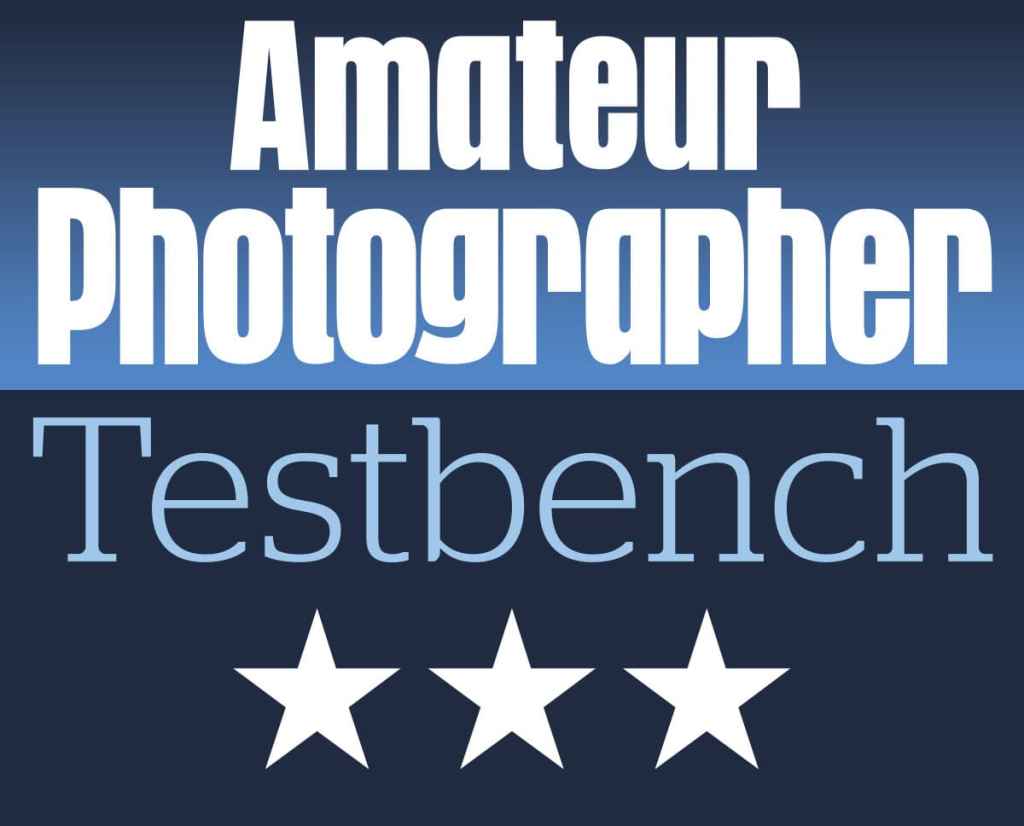
For more options, have a look at the best ultra zoom bridge cameras.

